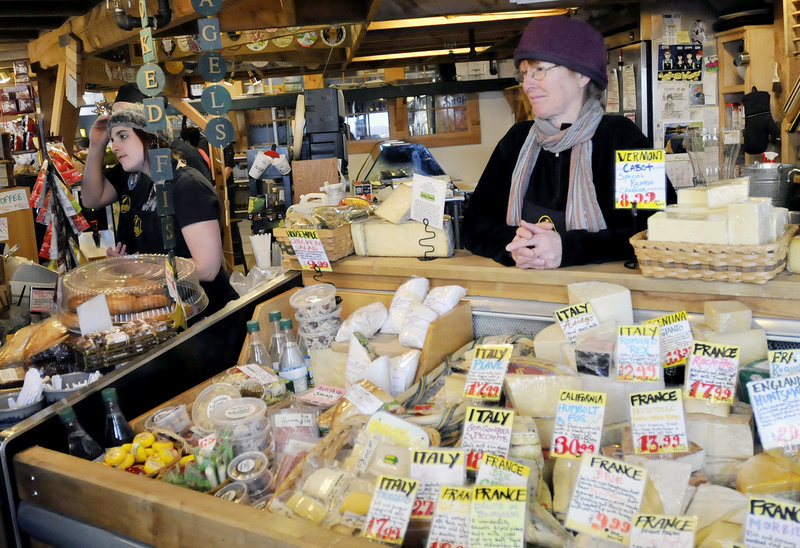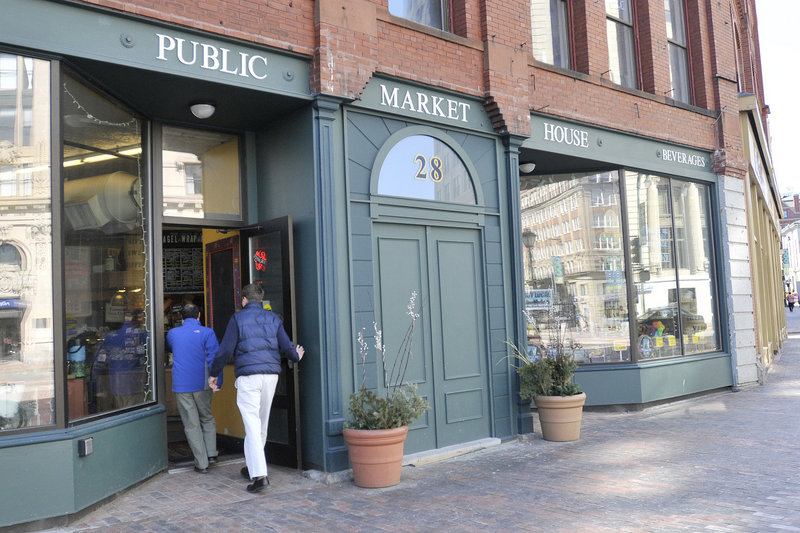PORTLAND — Tuesday was a fairly typical day in the Portland Public Market House — crowded and busy.
Downstairs, customers lined up at K. Horton Specialty Foods’ counter for the store’s array of cheeses. Sales of bread and sandwiches from Big Sky Bread were swift, and the line upstairs for Kamasouptra was long — which figured, given the day’s early-spring cold and brisk winds.
Kris Horton saw the busy market as proof that the leap of faith she and two partners took six years ago was worth taking.
The company that Horton formed with the owners of two other stores in the building in Monument Square announced this week that four more businesses are moving in, making 11 in all and essentially filling the place.
The Maine Squeeze Juice Cafe, Y-Limes Gourmet Desserts, Union Bagel Co. and La Cocina Dominicana are either moving in or have already opened in the market.
Horton has routinely expressed her belief in the venture, which started while the Portland Public Market, a half-block away, was closing in 2006. But she admitted Tuesday that she never saw it as a sure thing.
“It’s a miracle, frankly, that we are here and have been thriving,” she said.
The Portland Public Market House is an unusual take on the centuries-old concept of public markets. Most of the country’s public markets are sprawling spaces, usually on one floor. Portland’s is wedged into a small storefront on the square, and is spread over three floors.
There aren’t many examples of successful vertical public markets, said Janis Beitzer of Portland’s Downtown District, but the Market House is one that helps provide vibrancy to Monument Square.
“It helps anchor that area,” Beitzer said. “It’s the right product, in the right place, with the right variety.”
Horton said much of the market’s success came from its rejection of the by-the-book attitude of the Portland Public Market, where Horton and her partner William Milliken, the owner of Maine Beer & Beverage, started out.
The Portland Public Market, run by the Libra Foundation, had a long list of rules for vendors as it tried to operate as a traditional European-style market. The idea was to create the kind of market where people shop for groceries two or three times a week, picking up meat from a butcher, bread from a baker, fruit from another vendor.
But the location right off Congress Street drew office workers who were looking for a lunch spot rather than a grocery trip.
Eventually, the effort foundered. After the market was sold, along with the foundation’s other downtown real estate in 2006, the new owners converted the building into offices.
The Portland Public Market House, by contrast, became a combination of lunch spots and specialty stores, and took off about three years ago when a renovation of the second floor created more space for tables for lunchtime customers.
Owen Wells, the head of the Libra Foundation, said he’s happy to see the Market House succeed. He said he goes there frequently.
But, he said, it’s not fair to compare the Portland Public Market — which opened debt-free in a new, nearly $10 million building — with the Portland Public Market House, because the scale of the operations differs vastly.
“It’s apples and oranges,” he said.
Horton said her idea was always to let the market evolve, rather than have a preconceived notion that it had to fulfill. She also is particularly proud that the market has served as an incubator for small startups, noting that Local Sprouts began there before it needed more space and moved to another location on Congress Street.
Emily Roper, who opened Y-Lime a few weeks ago in space carved out of Horton’s store, said that record of success appealed to her as she sought to move her two-year-old bakery out of the kitchen of her home in Gorham.
She said sales of her cupcakes and other baked goods are better than she expected so far at the market, and the downtown location has created visibility that is leading to additional catering work.
Roper bakes in the market’s community kitchen in the basement, which is available for the market’s companies and is rented out for as little as $11 an hour, Horton said.
Community kitchens meet the needs of small caterers and fledgling food makers who can no longer operate in a home. Horton noted that commercial cooking is banned in many of Portland’s residential zones.
She said the kitchen in the market operates largely on “trust and communication,” to ensure that it’s kept clean and isn’t overbooked.
An elevator allows businesses in the market to take food from the kitchen to their counters.
Customers said Tuesday that they like the market’s food and its vibe in roughly equal measures.
Terri Douglass of Gorham, who tried a couple of peanut butter cupcakes from Y-Lime, said she usually gets a sandwich for lunch after checking out a few books from the Portland Public Library, across the square.
Upstairs, Andy Abrams of Portland and Richard Cante of Windham were finishing lunch in a relatively quiet corner of the eating area.
Both said they are regulars. Cante said it’s a great place for “coffee chats.” Abrams had a simple explanation of the appeal of the market.
“It brings people together,” he said.
Staff Writer Edward D. Murphy can be contacted at 791-6465 or at: emurphy@pressherald.com
Send questions/comments to the editors.





Comments are no longer available on this story